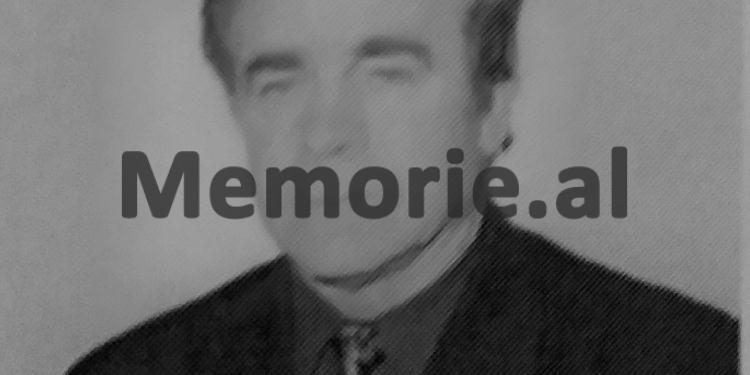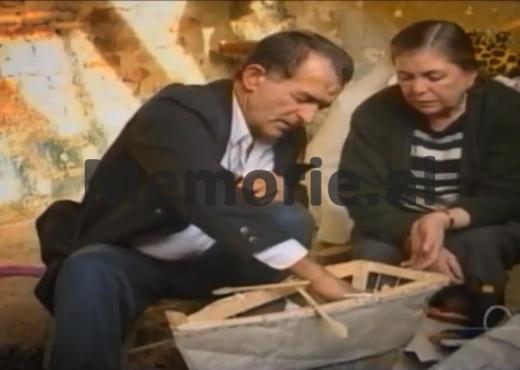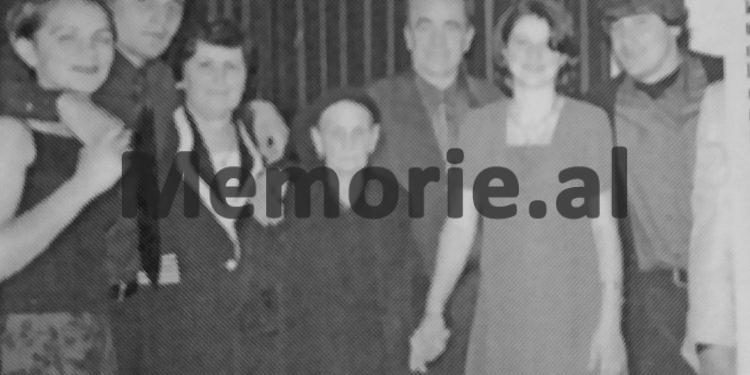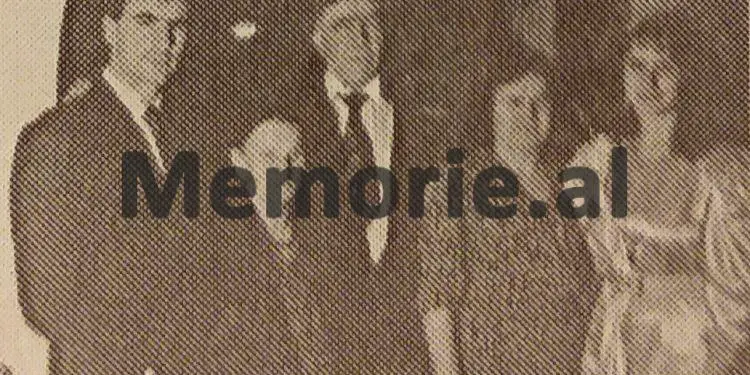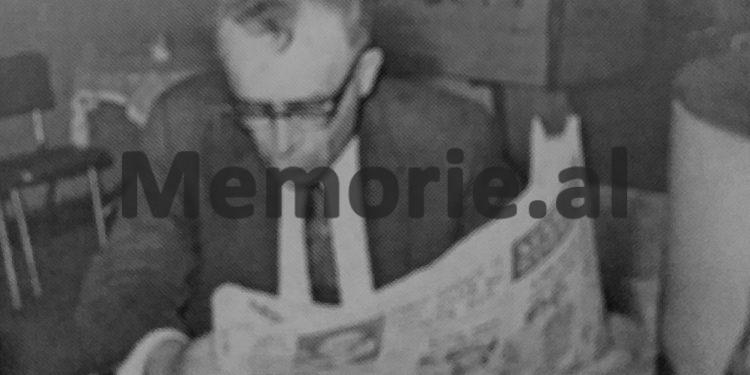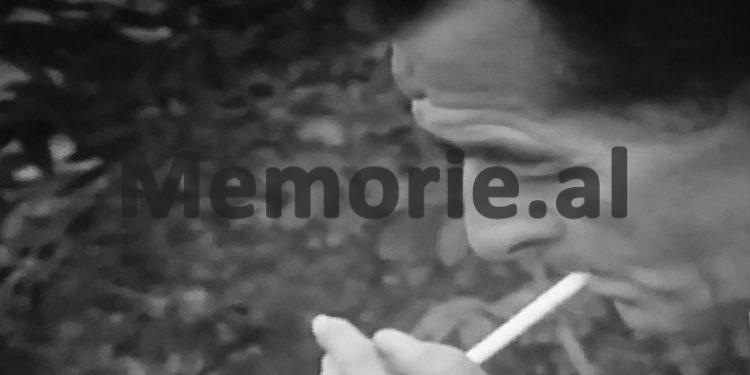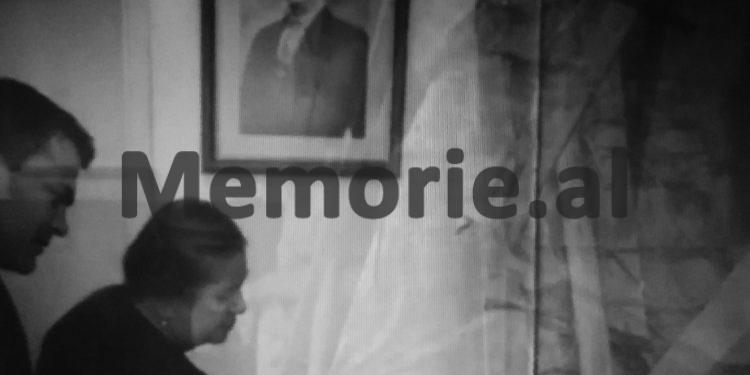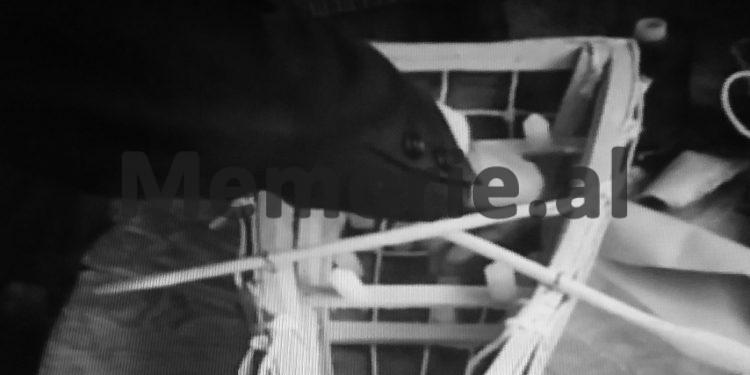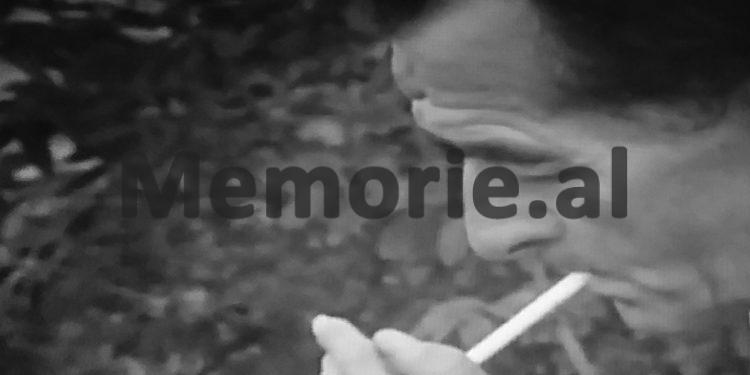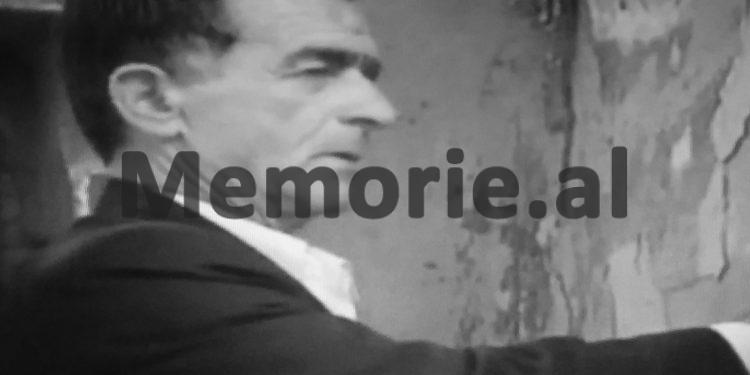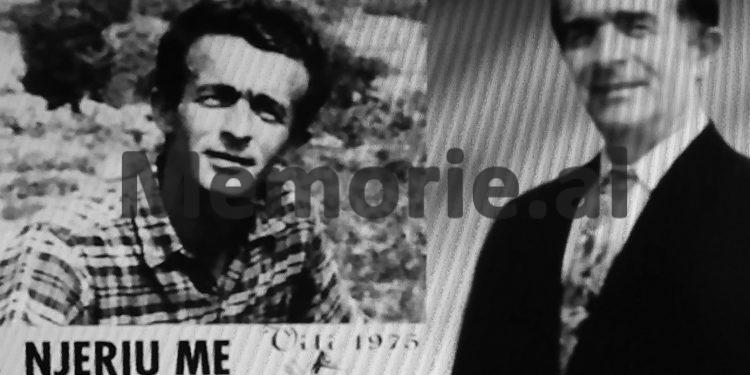Dashnor Kaloçi
Memorie.al publishes the story of the Fejzollari family from Pogradeci who, in July 1975, managed to escape from the lake of Pogradeci by a boat that they had crafted in the basement of their home. the town of Struga, where their ancestor came and took them, Hakiu, a former Partisan and close friend of Reshit Çollaku during the War, who fled Albania in 1949 and lived in Australia, as head of local government in Pogradeci, he had opposed terror and non-trial shootings against fugitives who were self-serving after the communist regime granted amnesty at the time…
“On June 25, 1975, when our brother Feridon had just come out of jail, we got together and decided to escape from Pogradec Lake for swimming. But that plan failed because we were dictated by the mother who found us a large commander in the basement of the house to which we had tied some planks. Mother gathered all three brothers and told us, ‘It’s not a solution what you thought, well me, but where do you leave the women and children left on the streets without any support and we will all rot. O let go all or die all, there is no other way out. After my mother’s words, we were convinced and decided to leave, all going across Lake Pogradec, and I undertook to build the boat we needed to escape. After eight days I managed to build the boat in the basement of the house and at midnight on July 3, 1975, day four, along with the other 16 family members, arrived on the other shore of the lake, in Ohrid. ”
Speaks and wonders about Memorie.al, Et’hem Fejzollari, who recounts the painful story of his family who, after being persecuted for many years by Enver Hoxha’s communist regime in July 1975, fled Albania illegally crossing the state border with a small boat on Lake Pogradec. How Haki escaped from Albania in 1949 and how he came from Yugoslavia three years later to meet his family in the internment camp in Kamza and how he was able to release them from exile after taking over the head of the Internal Branch of Pogradec, Nuci Tire? How was Haki Fejzollari’s family subsequently persecuted and how did they escape in 1975 from Lake Pogradec? What were the sentences given to the 17 senior Pogradec officials considered responsible for the sensational escape and how did the Fejzollari family get to Australia? Regarding these and other events of this family, he is aware of his testimony, Et’hem Fejzollari, who returned to Albania in 1991 and after being engaged for some time in politics and as an MP in the Albanian Parliament, is currently devoted to her family and her work.
Haki Fejzollari opposes communist terror
For the great merits and contribution he had made during the War, Ethem’s father, Haki Fejzollari, was appointed in December 1944 to the post of head of local government for the sub-prefecture of Pogradec, after which he had been involved in organizing. National Liberation Councils. While Hakiu was assigned to that important function, as the number one local leader of Pogradec, the Communist Party’s first secretary for that sub-prefecture, his comrade-in-arms, Pirro Gusho, was appointed. The first major split between Haki Fejzollari and Enver Hoxha’s communist regime originated in 1946 when the Tirana government declared a wide amnesty for many of Ball’s and Legal’s exponents, whom she regarded as her political opponents… In this regard, Et’hem Fejzollari testifies: “At the time that the amnesty was granted, many of those persons who were on the run in the mountains, such as Nuri Udenishti, Besir Placeri, Jaup Cesma, Hasan Malellari, Tushi Lacqua, etc., returned and surrendered themselves to the Internal Branch of Pogradec. But these persons who were called upon to surrender were not pardoned as promised but were all shot without trial. This frustrated my father Hakiu, who had many of the surrendered comrades in the guerrillas and partisan brigades, and he felt guilty for the infidelity that was being done to them. The father openly opposed the extrajudicial execution of all those men, saying some of them had made a major contribution during the War and that the act was open terrorism. This reaction of the father also brought about his first conflict with the Communist power, and in particular with Pirro Gusho, First Secretary of the Party for Pogradec and Nuci Tire, who was the Chairman of the Internal Branch of our city. As a result of his father’s attitude toward open communist terror, he became the subject of much criticism at various Party meetings, qualifying as ‘openly supporting reaction and anti-partisan elements’. Criticism of Haki continued for a long time as he disobeyed the Party line and as a result of that attitude, he was dismissed from the post of Mayor of the local government and assigned to work as an inspector in the Collection Company in the town of Pogradec, ”Et’hem Fejzollari recalls of his father Hakiu.
The arrest of Haki Fejzollari
In July 1949, while Hakiu continued to work as an inspector at the Pogradeci State Collection Company, he was arrested along with several other friends. Concerning this, his son Et’hem testifies: “The arrest of my father and some of his friends came after some denunciations made by Xhemal Monastery, which had been introduced by the security authorities and not to be deconstructed. he was arrested along with his father’s group, Haki Hadaj, etc. After being held for eight days, his father and his friends were released, and since then his father left his job at home and spent some time at home. On August 8, 1949, his father was summoned to the offices of the Party Committee, where the First Secretary, Pirro Gusho, along with the Branch President, Nuçi Tire, apologized for the arrest he had been made and proposed to him, to begin with. work that day as responsible for the State Collection Enterprise. The father accepted that position as he was still a party member, and by the following day, August 9, he was informed that by order of the Party Committee, he should go to the town of Prrenjas, where he would deal with the recruitment of recruits. young. The father was also instructed that before leaving for that service, he should receive clothes and food for three days, and at eight o’clock in the evening, he should report to the Party Committee, where other orders would be communicated to him and departure for Prrenjas. According to what he was told, the father showed up at the appointed time on the Party Committee and was given the Jeep car that the Committee had and two unknown persons who would accompany him during the service. Along with the two men, a third person was assigned to the rank of captain, named Selman Vishocica. At nine o’clock in the evening, the four of them left for Prrenjas and, while they were traveling, the driver of the Jeep, the personal driver of the Branch President, Nuçi Tire, stopped the car and told them to get down and lighting a cigarette while he would deal with the defect. The father of unknown persons had got out of the car and started shaking a cigarette, Captain Selmani, whom he had known since the war, pulled out his pistol and put it on his head, saying: ‘Haki, you are a traitor to power, this will take your soul tonight. ‘ At that moment, the two strangers threw a military cap on his head and, after tying his hands with barbed wire, put him inside the car. After that, the car turned around and they stopped near the Trhan River Bridge, where they took down Haki and went about twenty steps down the street, beating him with the car chains. Then they loosened his hands and gave him a barrel and a shovel telling him to open the pit himself, where they would take him after they executed him. Captain Selmani with the two strangers gave Haki to him saying that if he agreed to open the pit himself, they would kill him with a bullet, and if he refused, they would kill him with a barrage. The father agreed to open the pit himself, thinking that it was better to be killed by a bullet, as many of his friends had been killed during the War. As the father continued digging the pit so devastated by the wounds that drained his blood from the chains, two cars crossed the road, escorting Interior Minister Mehmet Shehu, who was heading to the Korça area where riots had begun at the border with Greece, also known as the August Provocations. As soon as he saw the forbidden Jeep throwing lights on the road, Mehmet Shehu stopped his car near it and asked the driver what was happening there. The Nucci Tire driver responded by saying that; a traitor was being executed there. Mehmet asked again who he was and the driver said: ‘A long Haki from Pogradec’. Upon hearing that name, Mehmet again asked for clarification, asking if it was Haki Fejzollari they told him that he was, he got out of the car and approached where his father was digging the pit under the threat of two unknown gunmen and Captain Selman Vishocica. As soon as he saw his father in that state, Mehmet Shehu said: ‘You too, Haki, have betrayed yourself and the blood of friends’ ?! Upon hearing his voice, Hakiu immediately recognized Mehmet Shehu, who had served as commander of the First Brigade in the war years.
Following the words of Mehmet Shehu, the father replied: ‘I have not betrayed my comrade, nor myself nor the blood of the comrades who were killed in the war, but have betrayed those who have brought me here.’ Following the father’s words, Mehmet Shehu asked Captain Selman Vishocica if Hakiu would stand trial. After Salman replied that he did not know anything, Mehmet ordered him: ‘Tell Nuci Tire, if Hakiu goes to court, bring me all the documents to the Ministry.’ At this time the father intervened, saying: ‘Comrade Commander, not only did I not go to trial, but I was never called upon to be politically criticized and I’m still a party member. ‘ After those words, Mehmet ordered them to release Hakiu immediately and to send a written report on who had ordered it. Upon Mehmet Shehu’s order, they took the father and sent him to the Interior Branch, where they were waiting for Nucci Tira with Pirro Gusho, who, after reporting to Captain Selman what had happened, released the father on condition that he be released. he would not tell anything about what happened to him, otherwise, he would answer before the Party, “recalls Et’hem Fejzollaroi about the event of his father, who escaped the safe and tragic death, only through the intervention of Mehmet Shehu, who passed incidentally where he was being executed.
The Escape of Haki Fejzollari in ’49
After escaping death nails, Haki Fejzollari, at first, did not tell family members justifying the injuries that he had a car accident, but then he told his mother everything. Concerning this, Et’hem relates: “After that event, his father became unbearable because Nucci Tira repeatedly provoked him until he forced him to flee in order to lose track of the crime they had committed. with him. So on August 16, 1949, the father fled to Yugoslavia, where he was initially held for 13 months in prison, accusing him of going there on a mission from Tirana. After our father escaped, we were removed from Pogradec and interned in Fushe Kruja. In July 1952, the father, along with six other Albanian escaped comrades in Yugoslavia, entered Albania illegally and came to the Kamza Camp, where we suffered deportation. He met his mother when she was filling water outside the camp and said, ‘Go take the kids and let’s go.’ After her mother explained that it was impossible, since we were appealing, her father became mentally ill and left with all his friends to Pogradec. When he arrived there at two o’clock in the night, the father went and knocked on the Branch Chairman’s house, Nuçi Tira, while his companions were on alert with guns in hand. Nucci’s wife opened the door after her father told her that Nucci’s friend was coming from Tirana, he went in with a gun in his hand and addressed Nucci saying: ‘If for 60 days, I will not release my family from I will be deported and I will not bring them here to Pogradec, I will kill these children with my hand. Do not be afraid today, that I have come to you as a friend and do nothing. ‘ After those words, the father left with all his friends and crossed the border again to Yugoslavia, while Nucci Tira came to Tirana the next day and told Mehmet Shehu, insisting that; or transfer him from Pogradeci, or else release Haki Fejzollari’s family from exile, because Haki was one of those men who kept his word. Nucci persuaded Mehmet Shehu to release our family and take us to Pogradec so that when father came to pick us up, they would arrest him. Mehmet accepted Nuçi Tira’s suggestion, and we were taken back to our house in Pogradec, where two policemen inside us as tenants, where their wives were also provided with automatic weapons. During that time, our home was guarded by armed civilians who were waiting for our father to come and pick us up, ”recalls Et’hem Fejzollari of his family’s vicissitudes.
Escape plan in 1975
Since 1952, when Haki Fejzollari’s family returned to their home in the town of Pogradec, she was constantly under the surveillance of the State Security who had been waiting for Haki from Yugoslavia to pick them up. The same thing did not happen, because after the family returned to Pogradec, Haki left Yugoslavia and went to Greece, wherein 1953 he emigrated to Australia. From then on, the family of Haki Fejzollari in the town of Pogradec was badly viewed by the communist regime and subjected to persecution as a reactionary family, deprived of many rights by the most elementary. Regarding this, Et’hem relates: “If it were not enough for what we were removing as a family, several years after our father escaped, we were arrested by Big Brother Feridon, who was released from prison in 1973 after suffering for 13 years. -year as a political prisoner. Even after his release, our lives became unbearable, because not only were we all left without a job, but the State Security was constantly monitoring us and we were under unprecedented psychological terror. Given our current situation, I, along with my two other brothers, decided to flee to Yugoslavia, but that plan failed because our mother found us a living commander in the basement of the house, which we had arranged for with some boards as a boat… After that, on June 25, 1975, the mother called all three of our brothers and said, ‘This is not a solution, well me, but where are you going to leave women and children who will rot across prisons and internment without any support and in the mercy of fate ?! Either we all leave, or we all die, there is no other choice. ‘ After my mother’s words we decided to run away and so I arranged for a boat (since I had worked as a carpenter) to leave via Pogradec Lake. For seven days I worked in the basement of the house making the boat skeleton, which I had calculated to carry the weight of the 16 members of our family that would sail with it. After I finished the boat skeleton, to test it I fitted it with a raincoat from the tables we had seen in the car. On the 3rd of July, we transported the boat boards from house to a place called the “Second Fort” (bunker) at the Castle, which was no more than 100 meters from the lakeshore and left our brother there. the youngest and one of our nephews to guard him, ”Et’hem recalled.
Vicissitudes before boat escape
After building the boat and transporting them from their home to the place called the “Second Fort” of the Fortress, the Fejzollari brothers made the final preparations to leave Albania via Lake Pogradec, where at that time no such adventure had been heard? Regarding this, Et’hem recalls: “The reason we had set a date for July 3 to flee was that in those days the Border Command did not turn on the big floodgate that controlled the lake, which was done to save electricity… According to the plan we had made earlier on the night of July 3, we burned all the family documents and pictures and before leaving home, we left a letter stating all the reasons that had forced us to flee Albania. , which had to do with the repressive attitude we had toward our family. After leaving the paper on the table, we took with us a rifle, two grenades, and three kg. dynamite with wicks and capsules and about nine o’clock in the evening, we all left home, splitting into four groups in different directions. We had decided that if the border guards were watching us, we would blow ourselves up with dynamite so as not to fall into their hands. At ten o’clock in the evening, we all gathered at the bunker where we had hidden the boat and immediately made it ready for landing on the edge of the lake. But we had to wait about two hours, because at that time a large convoy of reservists, coming from a military exercise, was crossing the national road. At about 12:00 pm, after making sure there were no more reservist movements, I took the boat with my little brother who did not weigh more than 60 kg. and we set it down. But as we approached the national highway, we landed the boat immediately on the ground, after seeing two people on a bicycle having stopped and bugging at the bunker where our family’s people were hiding. They had stopped after hearing the crying of one of our children for several months, and had become curious as they suspected that child would be coming to the lake at 12 noon! The older brother Feridon, whom we had left on the road, approached them and threatened them. At that moment listening to their debate, I approached to see what was happening there and saw that they were two Starovo villagers working at the Red Stone Mine. To dispel their suspicion, I reached out to Brother Feridon, saying: Comrade Brigadier, I know these and are not among those who steal the cherries of the Farm. While I was talking, Feridon understood my game and said: Ideally, I would go to the director of the Mine, Zvetan Mazniku, to make it clear that he had let the workers steal the Farm’s cherries, but with whom you know, let them go. As I made sure they left and doubted nothing, I went back to the little brother waiting for me and immediately took the boat and threw it into the water “.
Escape by boat
At about 12 noon on July 4, 1975, the 16th Fejzollari family boarded a boat and set sail deep into the lake heading for the other shore. Regarding those moments of distress, Et’hem testifies: “As we sailed in the darkness of the night across the lake, we were afraid that our raincoat would break and we would all sink. As we drove the boat, we were at times at risk of being overwhelmed by some of the huge waves that were occasionally created. About two o’clock at night, the moon came over the Dry Mountain, which added to our anxiety, as the whole lake was illuminated and looked like a mirror from the town of Pogradec. Shortly after our fate the moon was covered with clouds and did not come out until it was whitened. About four and a half o’clock in the morning, when we thought we had crossed our territorial waters, we saw signs indicating that we were still in the Albanian waters and had not reached our destination. At that time we speeded the shovels in order to cross the Macedonian waters without being noticed by our border guards. About 8 o’clock in the morning, we arrived on the other shore of the lake. There we met an Albanian who offered to take us with his van to the border with Greece, as he told us that Macedonians often returned Albanians fleeing. We refused to tell him that we had a father there in Struga, and as we talked to him, the police came and took us in three cars and took us to the Ohrid prison. After being interrogated, only the three brothers kept us in custody, and the women and children were released. After seven days, we were put on trial and sentenced to three weeks in prison for illegal border violations. As we were in solitary confinement, according to the announcement we had made, our father came from Australia, whom we met after 26 years. He made the assurances we needed and after seventy weeks, we all arrived in Melbourne, Australia, where my father had lived since 1953 “.
Repression and punishments in Pogradec
But what happened next in the town of Pogradec and what “taste” did the Fejzollari family escape there? Regarding this, Et’hem testifies: “The day after our escape, in Pogradec there was a lot of fuss, and the arrests and deportations of many families in our district and our families immediately began. My aunt’s son, Agron Haderi, and a close friend of mine named Muharrem Xhydollari were each sentenced to ten years in prison for lack of vigilance. The younger brother-in-law, Hazis Latollari, could not bear the pressure that was put on him and sank in the well. In addition to these convictions, a total of 17 senior Pogradec officials (one more than we had escaped) were fired, with orders from above, starting with the First Secretary, the Head of the Interior Branch, Security officers, etc. After staying in Australia for years, on May 11, 1992, we returned to Albania for the first time, where we found some Roma families who had been introduced by the Communist regime to ignore us after our escape. “, concludes his account of Et’hem Fejzollari, on the famous adventure of his family’s escape from Lake Pogradec in 1975, by means of a small boat built by him today in the Skopje Museum.
Who is the Fejzollari family from the city of Pogradec?
Origin of the Fejzollari family is from the town of Pogradec and by the summer of 1975, that family resided in the “Gorica” neighborhood which was also the first neighborhood where the old town lay. Ethem’s grandfather, Besir Fejzollari in the early 1900s, left his hometown of Pogradec and settled in Romania, where he worked closely with patriot Shahin Kolonja (Ypi) to publish the newspaper Drita… In 1907, Besir returned to the city of Pogradec where he did not stay long, for the following year he left Albania again and settled in the capital of the Ottoman Empire, in Istanbul, where he completed and graduated in three years. Military Academy of that city. Upon graduation, Besir Fejzollari returned to Albania and in November 1912, he accompanied the Korca County delegates to the raising of the Flag at Vlora, whereby a decree of Ismail Qemali, he was appointed military in the Provisional Government of Vlora. Following the fall of Ismail Kemal’s government in 1913, Besir fled Albania and emigrated to Romania, where many families from the towns of Korça and Pogradec had settled. He stayed in Romania until 1916, and at the time after World War I began, he returned to the town of Pogradec where he again entered as an officer with Albanian troops in the government of Turhan Pasha. In 1918, Besir married, and from that marriage, he had only one son named Haki. One year later in 1919, Besir was killed by the Italians in completely unknown circumstances in the city of Vlora, where he had gone with a service. Bashir’s son, Hakiu (father of Ethem), after completing a unique school in the town of Pogradec, along with his close friend, Kopi Hambo, enrolled in “Normale” in Elbasan, which he completed with very high results in 1936. After that, he returned to his hometown and from 1939, he was assigned to the local administration of the city of Struga, which was then under the jurisdiction of Tirana. During his time as a clerk in Struga, Haki Fejzollari got in touch with his cousin, Reshit Çollaku, who was interned in Greater Debar and from 1942, they both, together with Nuçi Tire, Pirro Gushon and Islam Dan (his cousin), engaged in the creation of the first communist cells in the Pogradec sub-prefecture. Then around the end of 1942, Hakiu joined a partisan group commanded by his cousin and close friend, Resit Çollaku, who fought together against the Italians in the battle of Pojska, where Reshit was killed along with eleven partisans. others of his gang. According to the testimonies of Haki Fejzollari, Reshit Çollaku (People’s Hero) was betrayed in the famous battle of Pojska and the bullets that took him from behind were his friends. In the summer of 1943, when Mehmet Shehu’s First Partisan Brigade was to be formed in Vithkuq, Korca, Haki Fejzollari was one of the partisans appointed as effective and by the end of the war, he was a company commissar in that formation. partisan. For the merits and contributions Haki Fejzollari had made during the War, since December 1944, he was appointed Chairman of the Council for the Pogradec Sub-Prefecture, where the first Secretary of the Communist Party for that district was Pirro Gusho. Memorie.al




